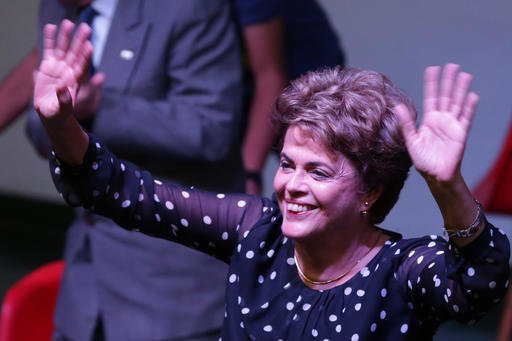
Amid the concerns and attention surrounding the Zika virus, the upcoming Olympics, and a volatile economy, Brazil is grappling with the possibility of presidential impeachment.
Brazil’s president, Dilma Rousseff, was suspended from her role as the nation’s leader on May 12.
Why? Rousseff has become an immensely unpopular figure because of what some see as ties to the uncovering of a major scandal. Rousseff served on the board of Petrobras, Brazil’s state-run oil company, from 2003 to 2010.
But in 2014, an investigation into Petrobras regarding allegations of bribery, money laundering, and controversial and questionable contracts that were awarded, began. In total, as much as $5 billion was potentially involved. The investigation has, so far, led to more than 150 arrests, and more than 200 individuals being investigated.
Rousseff, served on the Petrobras board during the time that these practices were occurring. The question is how much she knew.
But that still is not why the president is facing impeachment.
Rather, Rousseff is facing accusations that she has manipulated the government’s accounting records and budget in an effort to mask the country’s economic problems.
The fudging of numbers occurred in different ways, but Rousseff’s accusers say she funded social programs through government money from state-run banks, without making this clear.
The Washington Post’s Dom Phillips provided one example of a social program in his article citing a government created family allowance program. Basically, poor families could receive money from the government if they sent their children to school and had them vaccinated. The money was distributed form the government to banks, and then from banks to the families. But in 2013, banks began to claim they were not receiving their funds from the government.
Rousseff narrowly won reelection to a second term in 2014.
Her suspension earlier this month is not a direct impeachment. Rather, the Brazilian Senate elected to begin an impeachment trial.
Following this, Rousseff has had her presidential duties suspended for 180 days. This leaves Rousseff’s vice president, Michel Temer, as acting president.
The Senate now will hear the case, and if two-thirds vote to convict her, Rousseff will be impeached leaving Temer to finish the remainder of her term. Should less than two-thirds of the Senate vote to impeach her, her presidential powers will be restored.
Rousseff’s policy practices have been seen by some as being too focused on short-term goals.
“The federal government’s complete disregard for basic education, for example, is one more example that Brazil was being conducted based on very short term goals, instead of developing the needed infrastructure, professional development and international presence that a country needs to move from the outskirts of international public policy to a shot caller like the US or China,” explained President of the Brazilian Student Association at the University of Chicago, Eduardo Rubini.
Rubini said the recent developments show some of the systemic problems of Brazilian politics.
“It is indeed a much needed and tardy wake-up call that states what should be obvious: you cannot throw money at people and expect that to solve everybody’s issues. That is not how it works,” Rubini said.
The political battle could potentially be destabilizing not only to Brazil and the Brazilian economy, but to other nations as well.
“The lives of over 200 million people are affected directly, and these processes are politically destabilizing in the country where democracy is still being consolidated,” said DePaul political science professor Rose Spalding.
“And because her ouster also has consequences for other countries in the region, particularly Argentina, Venezuela, and Bolivia, along with several African countries that are close partners,” Spalding said.
“Personally, however, I doubt that the consequences of the change will be very positive, at least in the short run since the recession is driven by things like the slowdown in China and the declining price of petroleum,” Spalding said.
China, Spalding explained, is Brazil’s top trading partner.
Brazil’s economy remains highly unstable. A Bloomberg article published in January warned that Brazil is heading for the worst recession in more than a century.
Despite efforts over the past decade to reduce economic burdens, through such programs as the ones Rousseff is being investigated for, Latin America’s largest economy is still likely to continue contracting.
“I believe that Brazil has made a constant effort over the last decade to reduce income inequality and to take a number of people out of poverty, but not under a sustainable or adequate method. Again, throwing social benefits at people does nothing for a country when you don’t have a good education system and public health which enables students to attend it,” Rubini said.
Rubini, studying in Chicago, noted some of the differences between the United States and Brazil.
“It is hard to see how different life can be in a place as organized, law abiding and serious as the US and to realize how far our country is from that.”
Still, he expressed optimism.
“Brazilians are known to never give up. We may be dismayed at the current situation, but very few people actually consider giving up hope that the country will change,” Rubini said.

